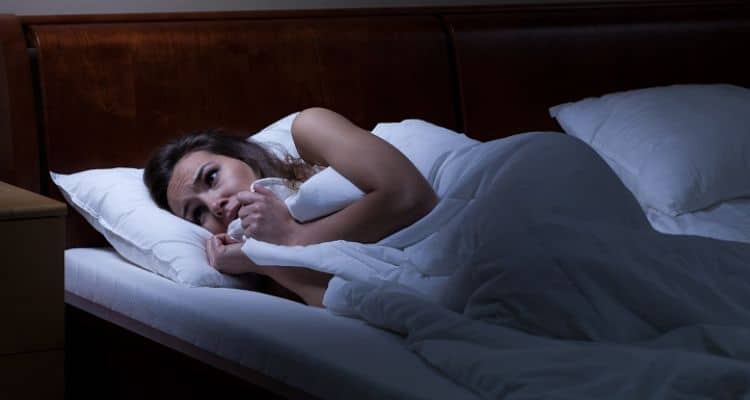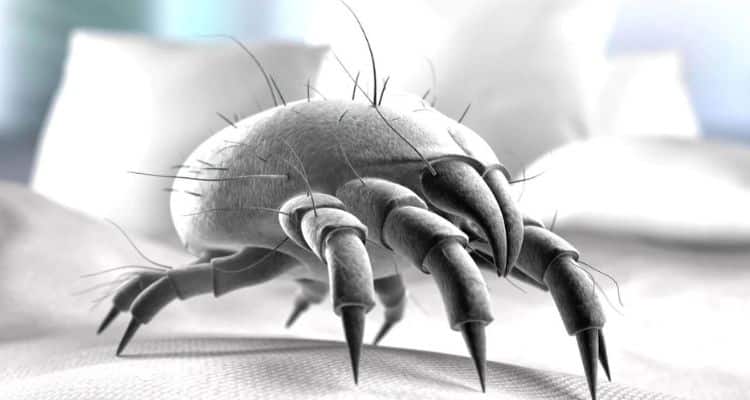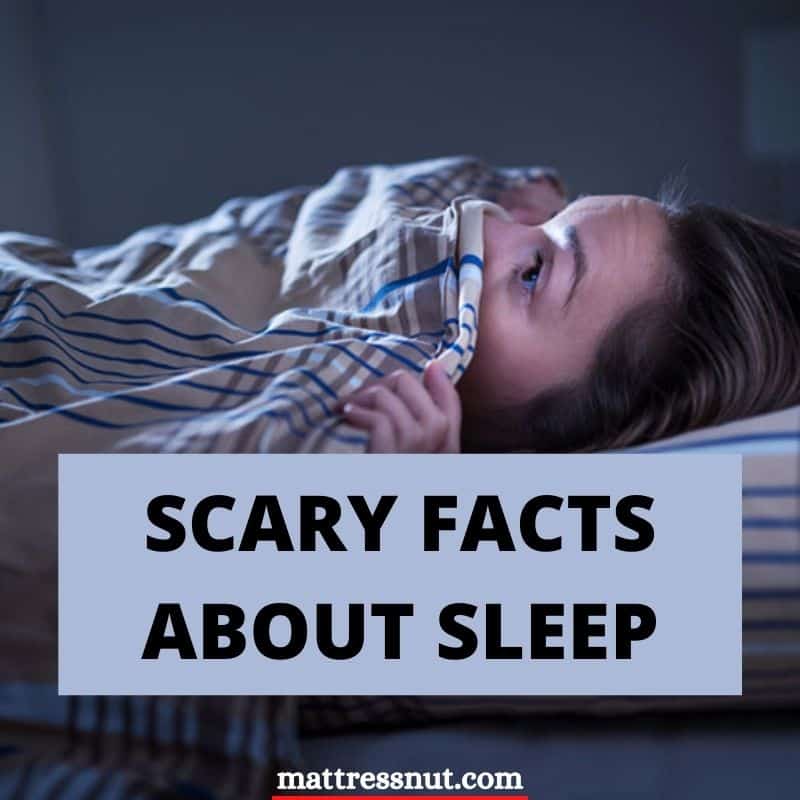Sleeping late at night or not sleeping all night, you might have felt very frightened. Several times you wake up badly after having a bad sleep, while other times, you may feel the creepy, lonely nights when everyone else in the house is sleeping.
We will discuss some scary facts about sleep, its causes, and general tips to minimize them. Now let me tell you that these happen to all of us, and you might be familiar with some, while some may be new to you. We have spent a considerable amount of time researching this for you so you can save your precious time. Let’s get straight into it.
11 Scary Facts about Sleep That You Need To Know
Waking Nightmares
Waking nightmares are very scary for first-timers, while the ones frequently having it know it’s a sleep paralysis with hallucinations. It feels something like you just woke up and sat in your bed.

Suddenly, a shadow comes closer and closer, making breathing difficult for you. You may even feel it touch you, but you can’t do anything. You might think for a moment that it’s a dream, but it isn’t for sure.
Although you can’t move any of your body parts during this time, you feel like your body is fully jammed. After a moment, you see the paralysis ends up, and the shadow disappears. This occurs when you fall asleep or wake up. Some people associate this with ghosts, but Science links it with the sleep-wake system in our body and its delays.
According to Harvard medical school, “Nightmares can happen for many reasons, anxiety, stress, medications, irregular sleep, mental health disorders, but the most common reason is post-traumatic stress disorder (PTSD).”
Hypnic Jerks
Hypnic jerks are super common, and almost everyone would have experienced it. Most of the time, you would have been sleeping. You might have slipped off a cliff or a very high place in your dream and moved downwards with an agile velocity. Your heart starts pumping faster, and you feel frightened.
Right before you hit the ground, you wake up unsettled and realize it was a dream. Although you were at your bad, you still moved with a strong jerk. You are such a jerk that someone sitting with you would notice.
Despite the reason why it’s caused, you would notice it occurs in the initial stages of your sleep, famous as non-REM stages. According to NIH, these hypnic jerks frequently happen to depend on your caffeine intake, as well as physical and emotional stress.
Folklore has talked much about it and has different opinions. Some say that this happens when your soul leaves your body during sleep and suddenly comes back, causing you the hypnic jerk.
Late Nights & Nightmares
Yes, sleeping late isn’t good for your health. It is said that sleeping late at night might be a factor in your frequent nightmares. Although folklore often ties these nightmares with demon work or witching effects, you should look for scientific reasons to back up your data.
To get rid of nightmares, you should get to bed early and sleep comfortably all night. This is one effective way to get rid of such frequent nightmares. The reason for associating them with your sleep schedule is that some scientists believe these nightmares are caused by cortisol.
These cortisol levels increase in the morning, resulting in your nightmares primarily. Some other reasons might be your food indigestion, stress, and mental/physical disorders. Your rule of thumb should be to go early to bed and wake up early in the morning.
Loss of Control
You might have seen people move violently while sleeping, injuring their partner or someone nearby. Sleep apnea and REM sleep behavior disorder are many sleep disorders that occur frequently. REM sleep behavior persuades your body to act while you are not awake.
This might be frightening to you if you haven’t experienced it yet. It can cause you to lose control of your body and let it move freely. Be sure you can kick or hit someone around and hurt him. This isn’t much common with everybody, so you need to treat it if you have this issue.
If you have been facing this for some time, you could sleep on the ground to avoid falling from your bed until the problem resolves. Secondly, if you are married, your significant other should sleep on another bed until your issue is resolved.
Sleepwalking
Another scary and creepy thing is the sleepers walking into their homes without waking up. Yes, I mean it! You might have seen or heard of someone walking asleep at night in the home. This is very dangerous as they might hurt themselves or others without consciousness.
While sleeping at night, you might go through a few stages of sleep without much notice. According to Medline Plus, sleepwalking most often occurs during deep, non-REM sleep early in the night. The common factors are alcohol, sedatives, and mental disorders.
Roaming around in the house or doing complex tasks that sleepers aren’t supposed to do normally are done by sleepwalkers. Sleepwalkers might often get stressed and attacked by anxiety.
Dream Control
This is very interesting because people with this characteristic can control their dreams. This type of self-controlled dreaming is famous as Lucid dreaming. The sleeper can continue a dream he woke up from or lead the dream the way he wants it to.
This is possible with continuous practice. Sleepers always know that they are dreaming and try to lead the dream according to their desire. Surprisingly, some people claim that they can even repeat dreams that they had in the past.
It might be new to many, but most of us might still be doing it unknowingly. If you are wondering whether it’s good or bad for your health primarily, then let’s discuss it. Although there isn’t much data to back it up, it’s said that dream control is responsible for disrupted sleep and mental health issues.
My simple understanding from this is dream control requires a lot of focus. It means the sleeper doesn’t enjoy enough rest as normal sleepers.
Blood-Sucking Hitchhikers
Although this isn’t relevant to your sleep disorder, it’s an external factor not letting you sleep peacefully. You are certainly aware of the blood-sucking hitchhikers and the trouble they cause when you want to sleep.
Imagine you want to sleep peacefully, and they start biting like real-life vampires. Believe me. You want close your eyes restfully. Who would want to bring such harmful and hated things to home? Well, you do it unknowingly. Yes, because you don’t look for them thoroughly regularly.
You will sleep comfortably and cozy if you properly protect your bed from these hitchhikers. However, if they somehow break into your home or bed, they replicate themselves and make it difficult for you to sleep. This problem exists worldwide, especially focused on your sleeping places like hotels, bedrooms, etc.
To get rid of these bed bugs, you must follow some precautions. Every time you visit a hotel room, check it everywhere for such bugs. If you find them then change the room immediately, else stay there.
When returning from a trip or an adventure, head to your garage before getting inside your home. Thoroughly check your luggage and search for such bugs, especially in your mattress and pillows. Once you are satisfied, you can get into your home safely.
Creepy Critters
Although you are aware and afraid of bed bugs, you don’t know something that is in your bed and can cause more trouble than those bugs. I am talking about the dust mites that always stay in your bed and can cause allergies and even asthma.

These dust mites feed on your shed skin cells. If you lie in your bed for hours, this might be the ideal environment for them to feed on your skin.
To eliminate such critters, you must focus on highly breathable mattresses, pillows, sheets, etc. The more breathable, the easier for dust mites to escape. Secondly, you need to wash and vacuum your bedding frequently. Lastly, always use mite-proof covers to get rid of such dust mites.
Insidious Growths
Like other fungi, the mold and mildew also grow silently without showing up until it becomes considerable. Removing them after they have spread over your mattress is almost impossible. These grow in dank areas with some humidity.
You will see mold often on the mattresses of people who sweat a lot. Further, you will find these fungi growing in moist places.
Sleep Paralysis
The most controversial topic our ancestors linked with evils and demon spirits coming to scare you is not thought of as it was. According to modern science, sleep paralysis is the feeling you have between asleep and awake. You can’t move during this, even if you want to, as if you are completely frozen. It lasts for a few seconds, and then you are normal. It gets severe if other sleep disorders accompany this.
One way to minimize this is to have a proper sleep schedule and rest. If your sleep is less than average, you might become a victim of the other dreadful things along with sleep paralysis that we discussed earlier.
Rapid Eye Movement
Rapid eye movement is the stage of sleep in which your eyes move rapidly although closed, and your brain’s activity, blood pressure, breathing, and heart rate increase. It is also known as REM sleep. According to National Cancer Institute, REM plays an important role in memory and learning.
Most of the dreams occur in this sleep stage. As it is a sleep stage, you won’t be able to move your muscles.
Key Takeaways: Scary Facts About Sleep
Waking Nightmares and Sleep Paralysis
Many experience waking nightmares or sleep paralysis, an alarming phenomenon where one feels paralyzed upon waking or falling asleep. Some might see approaching shadows or feel a choking sensation. Although sometimes attributed to supernatural entities, science connects it to the sleep-wake system in our body.
Physical Reactions: Hypnic Jerks
Hypnic jerks are involuntary twitches that can jolt a person awake, typically felt when dreaming of falling. Factors like caffeine intake and emotional stress can influence their frequency.
Late Nights Lead to Nightmares
Sleeping late can increase the likelihood of nightmares. Elevated cortisol levels in the morning are believed to induce such dreams. Proper sleep schedules and early bedtimes can help mitigate this.
Involuntary Movements During Sleep
Conditions like sleep apnea and REM sleep behavior disorder can cause individuals to act out physically during sleep, potentially harming themselves or others. Precautions such as sleeping separately or on the ground can be taken if one suffers from such conditions.
Wandering Minds: Sleepwalking and Lucid Dreaming
Some individuals might walk during their sleep, undertaking complex tasks without consciousness. On the other end of the spectrum, lucid dreaming allows dreamers to control and influence their dream narrative. While intriguing, continuous lucid dreaming can lead to disrupted sleep and potential mental health concerns.
Unwanted Bedfellows: Creepy Critters and Insidious Growths
Blood-sucking bugs and dust mites can disturb peaceful sleep, leading to allergies or irritations. Fungi, like mold and mildew, can silently develop in humid conditions. Regular cleaning and certain precautions can help in preventing these nuisances.
Importance of REM Sleep
During Rapid Eye Movement (REM) sleep, crucial processes like memory formation and learning take place. It’s also the stage where most dreams occur, and muscle movements are restricted.
Conclusion
All the facts we discussed today are a part of your daily life. You may have experienced most of these at night. We have explained their effects on your health and how you could minimize them.
You often don’t know how to overcome the things that regularly disturb your sleep at night and wake you up. This 15mins read could provide a ton of value for your upcoming sleep experiences. If you still have any questions popping into your mind, you can comment below. We would be happy to assist you.
Resources:
https://www.ncbi.nlm.nih.gov/pmc/articles/PMC4481805/
https://hms.harvard.edu/news-events/publications-archive/brain/nightmares-brain
https://www.cancer.gov/publications/dictionaries/cancer-terms/def/rapid-eye-movement-sleep
Scary facts about sleep FAQs
How Long Does It Take To Fall Asleep?
Normally, adults take 10-20 minutes on average to fall asleep. However, some might fall asleep in a couple of minutes, indicating that they either have sleep deficiency or are too tired. Besides this, sometimes it can be a medical condition as well. On the contrary, some insomniacs take more than the average due to stress, anxiety, or a special medical condition.
What Is The Longest A Person Can Sleep?
A normal healthy person can extend sleep up to 18 hours a day. However, according to the Guinness book of world records, Randy Gardner didn’t sleep for 11 days and 25 minutes which looks insane. You should never stay awake like as it can have severe bad effects on your health.
Who Sleeps For The Shortest Time?
Humans require a normal of 6-8 hours of daily sleep to stay healthy. However, some exceptions would only sleep for half the time we do, and they naturally require that much for survival. They don’t train themselves for this. Rather it’s more like their quality.
Do We Grow When We Sleep?
Sleep plays a very significant role in your growth. This is mainly because growth hormone is released while you are asleep. Therefore, not sleeping properly may affect your growth in the long term.

